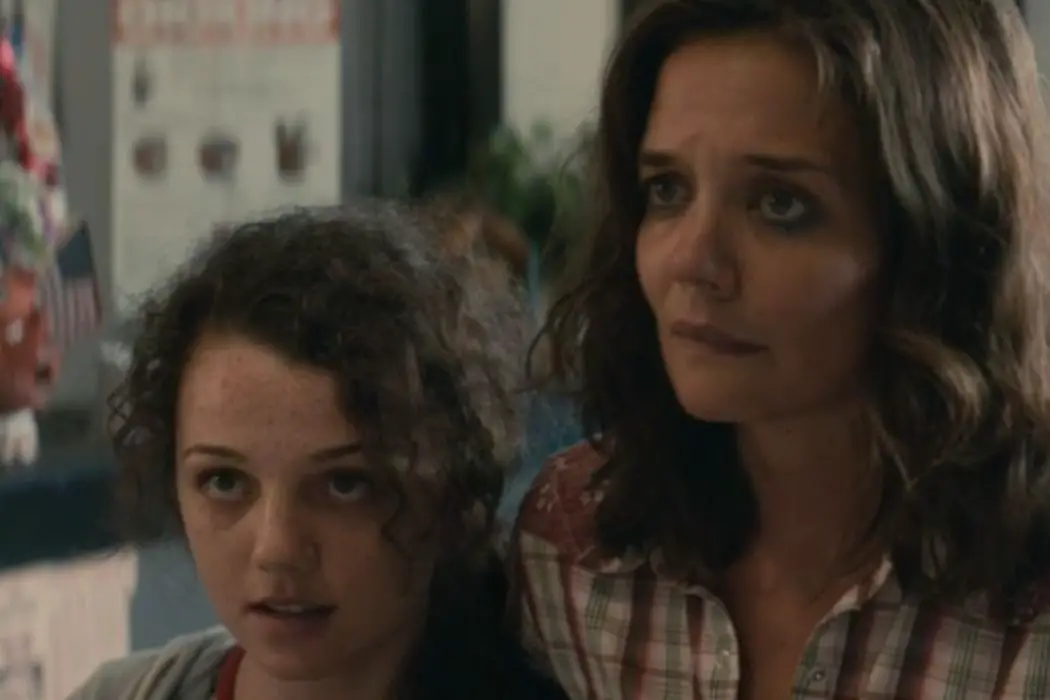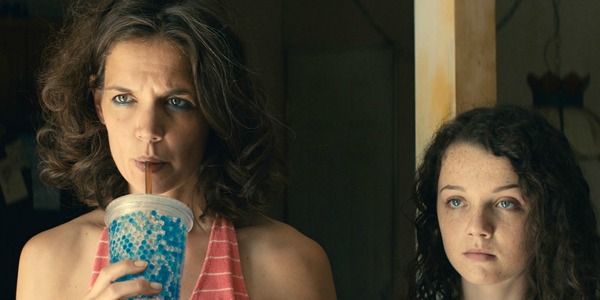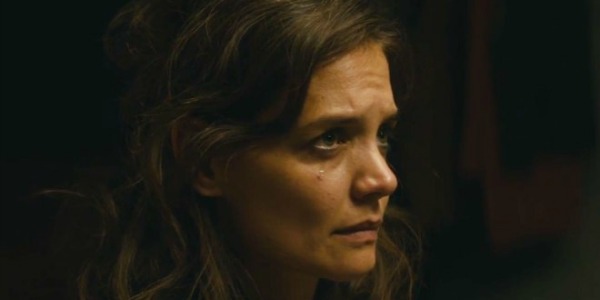ALL WE HAD: Katie Holmes’s Poignant Directorial Debut

Ivy is a freelance writer and film journalist in NYC…
Katie Holmes‘s feature directorial debut, All We Had, is adapted from Annie Weatherwax’s 2014 novel and is set in the 2008 financial crisis. In the opening scene, Rita Carmichael (Katie Holmes) flees with her daughter, Ruthie (Stefania Owen), while a terrible boyfriend is away. They hit the road hoping for a new beginning in Boston. The ease of their escape and immediate routines to deal with homelessness and poverty prove it’s the world Ruthie has grown up in.
A Portrait of Mother-Daughter Survival
Rita is a mother who’s clearly built for survival. Stealing food is a normal part of the day, she propositions a mechanic to pay for car repairs, and removes a bad tooth by jumping off a chair with twine tied to the window. Hinting at a horrific foster care upbringing, she’s desperate to keep Ruthie in her care. A dine-and-ditch goes wrong when her car stalls in the parking lot and the kindly cafe owner Marty (Richard Kind) gives them work. A cot in the backroom and some steady money coming in starts to boost Rita’s confidence.
But, Rita’s wrecked psyche defines her inability to make good decisions. She soon meets a slick realtor, Vic (Mark Consuelos), who gives her a house with a subprime loan and no downpayment. Ruthie goes back to school and forms a close friendship with Peter Pam, the transgendered niece who waitresses at the diner (a nuanced performance from Eve Lindley). With the diner losing business as America’s financial crisis takes hold, Rita falls behind on the payments. Drugs and drinking ensue.

Treating men like life rafts, she lets herself be saved by a mild-mannered widow (Luke Wilson). They attend AA meetings together and Rita plays house with the brittleness of someone who knows how to leave suddenly. Ruthie rebels against her mother’s habit of letting men dictate the course of her life but finds outlets only in familiar self-destructive habits she has picked up from her mother. It’s hinted in conclusion that while their lives will likely always be difficult, their unshakeable bond and deep commitment to each other will be the foundation to keep moving ahead to a better life.
Emotionally Honest
Films about single mothers hold a special place in cinema. The task of raising children alone is a rich terrain to explore in cinema. All We Had strikes out in some ways. The script feels too green in places with stereotypical lines of people down on their luck. The film also tries to take on too many issues at once, not allowing it to settle too deeply on any of them. The constricted dialogue prevents the characters from transcending into the rich, lived-in quality that makes films of single motherhood like Tumbleweeds, Mermaids and Postcards from the Edge so beloved.
However, Katie Holmes brings wholeness to Rita. An emotionally honest, ferociously dedicated performance shows Holmes’s tremendous range as an actress. She immersed All We Had with an excellent cast of memorable performances. Stefania Owen holds her own as the grounded, put upon daughter who’s both embarrassed and fiercely devoted to her mother.

The film is beautifully shot by Brett Pawlak, reminiscent of his work on Short Term 12. A gentle score underlies the steadfastness of this small family. That Holmes is a single mother herself is passionately felt in this film, even dedicating All We Had to her daughter Suri in the credits.
The Gender Politics Of Poverty
All We Had delves into the unique mother and daughter bond that’s forged through crisis. It highlights the complications of women’s liberation for an impoverished single mother. Ruthie resents her mother’s dependency on men for survival. But, nothing exposes how much of a men’s world it still is then when a bit of good luck is needed for an extremely disenfranchised mother.

Sexuality is a bargaining and survival tool in a way that we would never see in a feature about a homeless father and son. Films about impoverished men like The Pursuit of Happyness, Slumdog Millionaire and The Soloist allow men to use their intelligence or prodigal talent as the vehicle out of hard times. Rita’s relentless survival strategies reveal a bright, determined and ultimately optimistic individual but clearly has never been told this by anyone. The title All We Had hints at the idea that the mother and daughter are each other’s best and true allies in a system that still places inherent value on men far more easily than on women.
An Ambitious Directorial Debut
All We Had explores terrains that are rarely explored in cinema. It’s an ambitious and conscientious feature debut for Holmes. Her choice of subject material is one of the many reasons why more women need to be behind the camera. Her dedication to telling the kind of story that has had little representation on film announces her as an important figure in media for women. Katie Holmes establishes herself as a director to watch.
What do you think this film highlights about mother and daughter relationships that is universal?
All We Had opened in theaters in the United States on 9th December, 2016.
Does content like this matter to you?
Become a Member and support film journalism. Unlock access to all of Film Inquiry`s great articles. Join a community of like-minded readers who are passionate about cinema - get access to our private members Network, give back to independent filmmakers, and more.
Ivy is a freelance writer and film journalist in NYC and LA. Her passion for film started when her family brought home the entire video store from one of their supermarket chains. Her main interests lie in psychological horror and women & cinema. Her work has appeared in Film Inquiry, PopOptique, & Sordid Cinema. She's also a Programmer for the Bushwick Film Festival. More of her work can be found @ thefilmremedy.com













